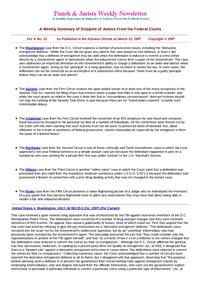In 1995, Lewis Matthews was a tenant at the Kenmore Hotel, the largest single-room occupancy hotel in New York City. A handyman, employed by a private maintenance firm, was repairing a hole in the wall in Matthew's room when he was assaulted by Matthews. He was first arrested by …
What does a judge do if she is about to sentence a defendant who she believes to be dangerously deranged, but who has already been held in pre-trial incarceration for such a long time that a sentence according to the Guidelines would mean imminent freedom? Well, in this case …
Departures based on consent to deportation.
Court held that there were no extraordinary circumstances present to defeat the language of Note 4 to § 3E1.1, which states that an acceptance of responsibilty adjustment is ordinarily unavalable if the defendant committed obstruction of justice.
Here's another "safety valve" case under the Guidelines - and this one is significant because of its holding that the defendant's possession of a firearm in connection with a prior drug dealing activities precluded application of the safety valve provisions contained in U.S.S.G. § 5C1.2. One of the five …
This is one of those remarkable cases about the state of justice in the State of Texas. After three defendants were convicted of various drug charges, they appealed, arguing that district court Judge Jack had so intimidated the venire panel of jurors that she had actually dumbed the panel …
See also U.S. v. Muscarello, 106 F.3d 636 (5th Cir. 1997).
Case is noted because it is one of two cases that the Supreme Court has agreed to hear to resolve the inter-Circuit split on the meaning of the "carry" prong of § 924(c).
This case involved a giant reverse-sting operation that was orchestrated by the FBI against numerous members of the D.C. Metropolitan Police Force. The defendants were convicted of a number of drug and gun charges and they each received sentences of 592 months. On appeal, they raised a gallimaufry of …
Here the court held that the district court lacks jurisdiction under 8 U.S.C. § 1252a(d)(1) to order deportation absent a request by the U.S. Attorney with the concurrence of the Commissioner of the INS.
Departures based on consent to deportation.
Although the court approved broad disclosure of information, including the realted acts of others, to qualify for a safety valve sentence reduction, it also emphasized that such information must relate to the common scheme or plan of the conviction.
Case held that on a resentencing based on Guideline Amendment 516 the district court is not free, under 18 USC § 3582(c)(2) to reexamine the factual determination of the number of marijuana plants attrtibuted to the defendant.
Citing a number of other decisions in accord, the Court held …
Here the Court rejected a broad series of constitutional challenges to the filing fee provisions of the PLRA, holding they do not violate prisoners' rights of access to the courts or their rights under the Equal Protection Clause.
Although the Court failed to grant any relief, it at least acknowledged the "derivative entrapment defense" where a defendant is induced to commit a crime derivatively when the inducement comes from a pawn of the Government.
This case involved a giant reverse-sting operation that was orchestrated by the …
Court held that when bullet that injured bystander came from a guard and not one of the defendants, the sentence enhancement under § 2B3.1(b)(3) was still applicable to the defendnants.
The enigma of the perpetually malfunctioning Speedy Trial Clock! The Speedy Trial Act (18 U.S.C. §§ 3161 et seq.) (the "STA") states that if a defendant is not brought to trial within a specified seventy-day time period, his indictment or information "shall be dismissed on motion of the defendant." …
QUOTE OF THE WEEK - Another view of the growing reach of Federal regulation over State crimes.
"The federal courts, with less than 10% of the judges of general jurisdiction in the United States, were not intended to take the place of state courts for routine offenses in which …
Rejecting the interpretation of every other Circuit to have ruled on the issue, the Second Circuit held that provisions of 18 USC § 851(a)(2) were ambiguous and could not be used to enhance defendant's sentence in this case.
The defendant in this case had previously been convicted under …
Court held that Judge Weinstein erred as a matter of law in holding that it was not reasonably forseeable that the defendant's co-conspirators would discharge their weapons during a robbery.
Here the Court threw out a series wire and computer fraud convictions, stating that those statutes must not be used to prosecute kinds of behavior that, while offensive to the aesthetics of prosecutors, cannot reasonably form the basis of a felony.
The defendant in this case worked for …
Here the Court held that while restitution is expressly included among the debts that may be collected under the Federal Debt collection Act, it may not be used as a vehicle to collect private debts such as those under the Child Support Recovery Act.
In his inimitable style, …
Court held that sentencing court did not engage in impermissible double counting by imposing enhancements under USSG § 4A1.1(d) after it had already imposed enhancements for the same conduct under § 4A1.1(c) and 4A1.2(c)(1).
The defendant was convicted of possession of a firearm by a felon. On appeal …
